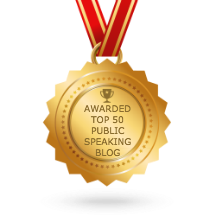Diction is articulation of consonant sounds. Consonants make speech clear, crisp and intelligible. I am so grateful to Arthur Lessac of The Lessac Institute for the training in diction he gave me. I realize that my speech is very easy for listeners to understand because of the Lessac Method I know and teach. Not many…
Read more
Dorothea Stuart, a communication coach and consultant from UK, is curating a great new public speaking Paper.Li called Speaking Confidently. Dorothea is including articles, blog posts and videos centered around public speaking. Her contributors include the biggest names in the public speaking world like Garr Reynolds at Presentation Zen, Nancy Duarte, Tom Antion, Tony Robbins,…
Read more
Having a gentle confrontation communication skill allows us to feel a sense of power to influence other’s behaviors. This week I share a very valuable confrontation communication skill learned from my personal trainer JV. During my training, two young men were using a body bar too close to the mirrored wall. JV stopped them without hesitation. Masterfully,…
Read more
TED Talks provide inspiration and great models for public speaking skills. TED recently shared the 20 most popular talks since TED began. If you would like a summer project to inspire you to reach for the stars and to develop your public speaking skills, watch all 20 of these, one per day. If you undertake…
Read more
I have been coaching non-native speakers of English to improve their pronunciation for almost four decades. I was trained by Arthur Lessac in the Lessac Method of Voice and Diction. Thanks to Arthur’s fine training and method, I can quickly and easily identify the sounds of English that non-native speakers need to learn. It’s also…
Read more
Learning to pronounce consonant sounds is vital to mastering clear, crisp, intelligible speech. This translates into meaningful spoken communication that is easily understood. Pronouncing consonant sounds clearly makes every word you articulate more precise. This in turn makes your overall message more readily understood by your audience, whether it is a small group or large…
Read more
There is no fast and easy way to reduce or modify an accent. If you are going to learn to reduce your accent, it is going to take considerable time and effort to practice. OK, now I have said it! I don’t mean to discourage you, but I do mean to help you be realistic…
Read more
People from all over the world come to the US because of the freedoms and opportunities we enjoy in our country. Freedom of speech is among our most cherished and valuable rights which draw ambitious and educated people to our nation. Houston, Texas is truly a melting pot for professionals especially in the oil and…
Read more
Happy July 4th! Let Freedom Ring throughout the World! – Sandra Zimmer The following post was written by my dear friend and social media expert, Karen Scott Jones. Thanks, Karen! How often do we reflect on our right to speak freely in this country? I think we take it for granted that we can say what…
Read more
There are three things to aim at in public speaking: first, to get into your subject, then to get your subject into yourself, and lastly, to get your subject into the heart of your audience.” – Alexander Gregg When you are called on to speak publicly, your job is to relate to your audience. Maybe…
Read more




